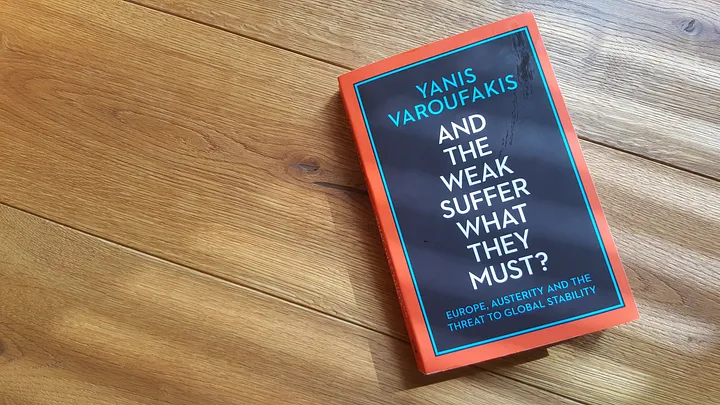- Posted on
- • Business
I think I just got religion
- Author
-
-

- User
- aydin
- Posts by this author
- Posts by this author
-

For my dear friends who know me better, have no fear — the world has not stopped spinning on its axis nor have I started believing in a supernatural being that may pull from from the brink of despair and continued desolation in this era of Trump.
No, I write after having just finished the latest book from Yanis Varoufakis.
It was bought for me by a good friend who was trying to explain to me why my mindless optimism for the EU post Brexit needed more than a little qualification.
This it not a book review, but I must say it is gripping, witty, and beautifully crafted as a piece of economic history goes. He discusses the lead up to the creation of the Eurozone from Bretton Woods onwards, and provides a great backdrop to the crisis that it is still feeling it’s way through in early 2017. By way of sidenote, my only gentle warning is that he makes limited effort to provide genuine context or discuss the local national reasons for indebtedness (i.e. don’t expect more than a sentence or two on the kleptocrats who led Greece, Italy etc to their respective deficits and fate). This notwithstanding, a definite 5* rating.
I do however want to take a moment to discuss what I feel I learnt and why I am a convertee to the pragmatic and fair-minded vision Varoufakis has for the Eurozone and why it is historically so important.
Firstly, the implications of the failure of the Eurozone and the wider EU project do not bear thinking about. When you read of the rise of Golden Dawn in Greece in the latter chapters of this book, and put it in the context of UKIP in Britain, the FN in France, AfP in Germany and Geert Wilders in the NL, it is clear that liberal democracy needs leadership and some success stories to realign our planets.
Secondly, it appears that the actions of the Troika (ECB, EC and the IMF) show no understanding of the errors of the past (e.g. failure of the Gold standard, Versailles, Brettons Woods and the eventual Nixon Shock) — nor a recognition of the need for surplus nations to recycle through the deficit nations as such lack of sustainable policy leads consistently to desolation. If anyone can point me to a decent discussion that explains the Troika’s irrational and apparently economically and historically illiterate approach to surplus-recycling, I would welcome the reference.
Thirdly, it is immoral and intolerable the way in which Germany and France post-2008 credit crunch insisted that governments of deficit countries nationalised private debts (e.g. Deutsche Bank, BNP etc were all over exposed to Greek and Irish treasury bills) to avoid having to fully bail out their own banks. These were the same banks who had spent the previous 10 years ramming debt down the necks of kleptocrat Greek administrators like Charentais farmers with seed to their geese in order to later enjoy the fois gras with a drop of Montbazillac. On this point, there is plenty of blame to share about between the banks, the credit ratings agencies and the receipient governments.
Fourthly, he advocates a purer form of democracy within the Eurozone, either increasing powers in the existing Parliament or federalising structures more with direct input from nation states’ existing governments (something which currently happens indirectly through appointed representatives on the Council of Europe). Without it, he states, monetary union is doomed to failure.
Finally, Varoufakis and colleagues took the time in 2013 to draft “A Modest Proposal” which laid out some key ideas for how to resolve the surplus-recycling problem and managing crises within the confines of existing EU treaties (hence the use of the word “Modest”, in that it requires limited if no treaty changes or new bodies — just repurposing what we already have).
There has been criticism of this paper claiming it does nothing to deal with moral hazard, or that it simply mutualises debt amongst Eurozone countries with no pre-conditions. However, the Troika pre-conditions have done nothing to address deficits (in fact they have made them worse). In addition, the moral hazard question is only relevant in the absence of proper banking and budgetary regulation — something that allowed German and French banks to lend with profligacy for so long.
As the USA, with its own deficit status entrenched, no longer able to pull the global economy out of more than the odd bump in the road, it is clear that the ditch that the Eurozone finds itself in is of serious risk to the global economy. The surplus vs deficit nation challenges also make clear that without the surplus recyling ideas of Varoufakis in place, the UK would never have been sensible to join the Euro, unable as it might try to compete with the might of the export success of the austere German economy.
If strong export-oriented nations such as Germany do not accept their responsibility in recycling their surpluses, they should simply look to recent history (as Varoufakis merely asks us to) and recognise that the result will not be pretty for all — surplus nations included.